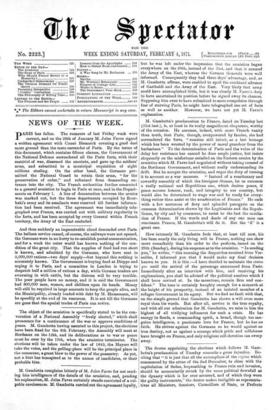How intensely M. Gambetta feels that, at least till now,
his• has been nearly the only living will in France, nothing can show more remarkably than his order to the prefects, issued on the 29th (Sunday), during his suspense as to the armistice. "In sending you," he writes, " this morning the despatches received from Ver- sailles, I informed you that I would make my final decision known to you. It is this :—I have decided to maintain the status quo until the arrival of the personage announced from Paris. Immediately after an interview with him, and receiving his explanations, you shall be advised of the political resolves which I shall have arrived at. In the meantime, remain firm and con- fident." The tone is certainly haughty enough for a monarch at the height of his prosperity, instead of an isolated member of a refugee Government in its agony. But we find no fault with that, on the simple ground that Gambetta has shown a will even more royal than his words. But after all, service is the true royalty, and with all our admiration for M. Gambetta, we miss in him the highest of all vivifying influences for such a crisis. He has energy in floods, a commanding spirit, a broad, though too san- guine intelligence, a passionate love for France, but he has no faith. He strives against the Germans as he would against an iron destiny, not as against a scourge which pride and selfishness have brought on France, and only religious self-devotion can sweep away.






























